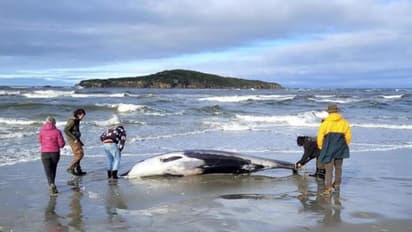World's rarest spade-toothed whale, measuring 16.4 feet long, washes ashore on New Zealand beach (WATCH)

Synopsis
The body of a spade-toothed whale, an extraordinarily rare species that has never been observed alive, has been discovered on a beach in southern Otago province, New Zealand, scientists announced.
The body of a spade-toothed whale, an extraordinarily rare species that has never been observed alive, has been discovered on a beach in southern Otago province, New Zealand, scientists announced. The remains of the five-meter (16.4 feet) long beaked whale were found near a river mouth on July 4, according to government researchers.
Identified by marine mammal experts from New Zealand's Department of Conservation and the national museum, Te Papa, the whale has been classified as a male spade-toothed whale. To confirm this classification, a DNA investigation has been initiated, the scientists said.
"Spade-toothed whales are one of the most poorly known large mammalian species of modern times," stated Gabe Davies, the Department of Conservation’s coastal Otago operations manager.
"Since the 1800s, only six samples have ever been documented worldwide, and all but one of these was from New Zealand," Davies added, highlighting the significance of the discovery from both scientific and conservation perspectives.
The freshness of the find provides a unique opportunity for researchers to dissect a spade-toothed whale for the first time, offering potential insights into the elusive species. Due to its rarity, almost nothing is known about the spade-toothed whale, making this discovery particularly valuable.
Recognizing the international importance of this event, the body of the whale has been placed in cold storage, and genetic samples have been dispatched to the University of Auckland, which curates the New Zealand Cetacean Tissue Archive. Processing the DNA and confirming the final identification may take several weeks or months.
"The rarity of the whale means conversations around what to do next will take more time because it is a conversation of international importance," the conservation department said.
First described in 1874 from a lower jaw and two teeth collected from the Chatham Islands off New Zealand's east coast, the species has remained largely a mystery. Skeletal remains from two other specimens found in New Zealand and Chile confirmed the existence of a new species, but live sightings remain nonexistent, resulting in the spade-toothed whale being classified as "data deficient" under New Zealand's Threat Classification System.
The first intact specimen, a mother and calf, was discovered stranded in the Bay of Plenty in 2010, followed by another specimen found in Gisborne in 2017.
This recent discovery holds significant promise for expanding scientific knowledge about the spade-toothed whale, potentially unveiling new information about its biology and behavior.
Check the Breaking News Today and Latest News from across India and around the world. Stay updated with the latest World News and global developments from politics to economy and current affairs. Get in-depth coverage of China News, Europe News, Pakistan News, and South Asia News, along with top headlines from the UK and US. Follow expert analysis, international trends, and breaking updates from around the globe. Download the Asianet News Official App from the Android Play Store and iPhone App Store for accurate and timely news updates anytime, anywhere.